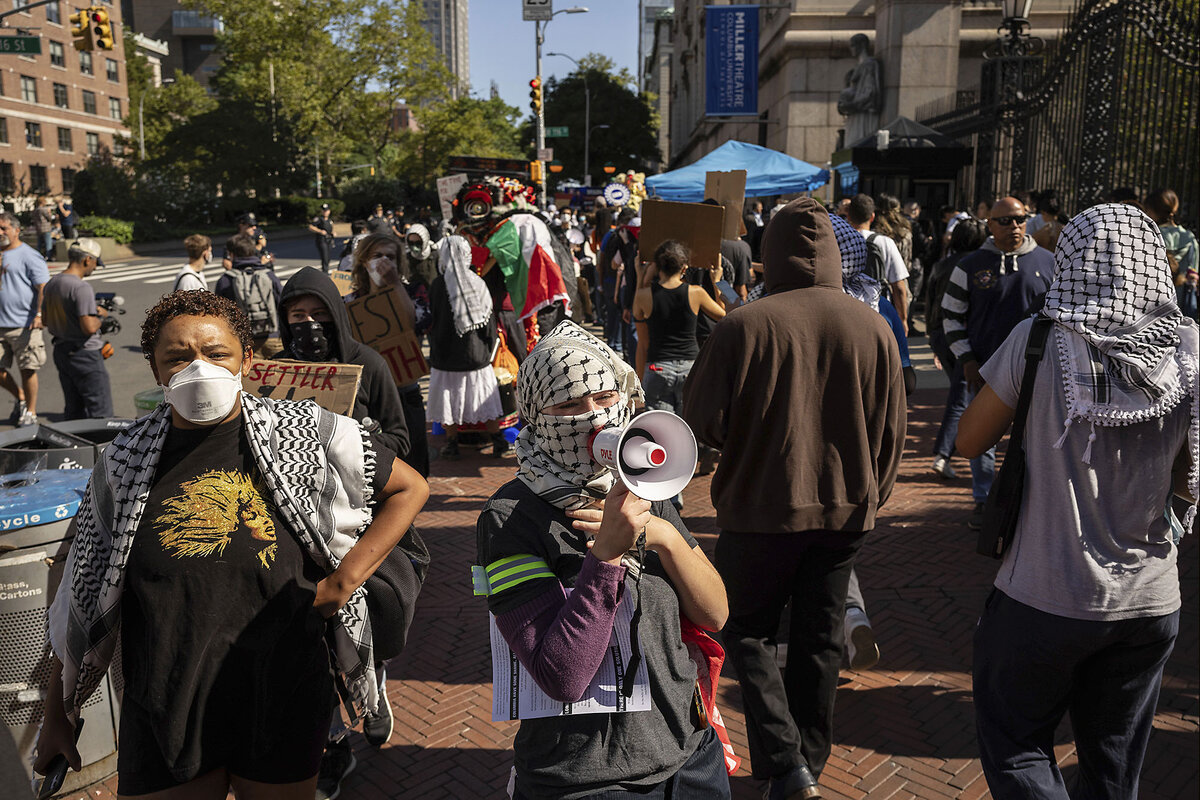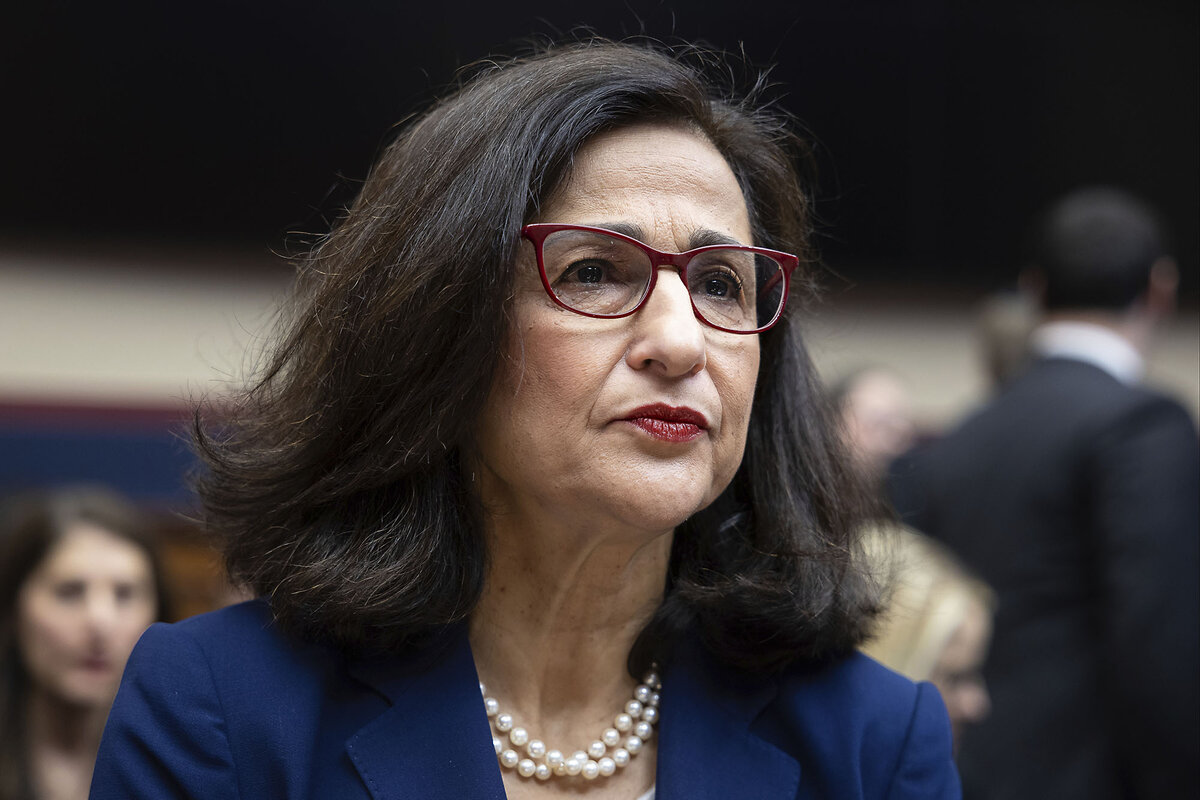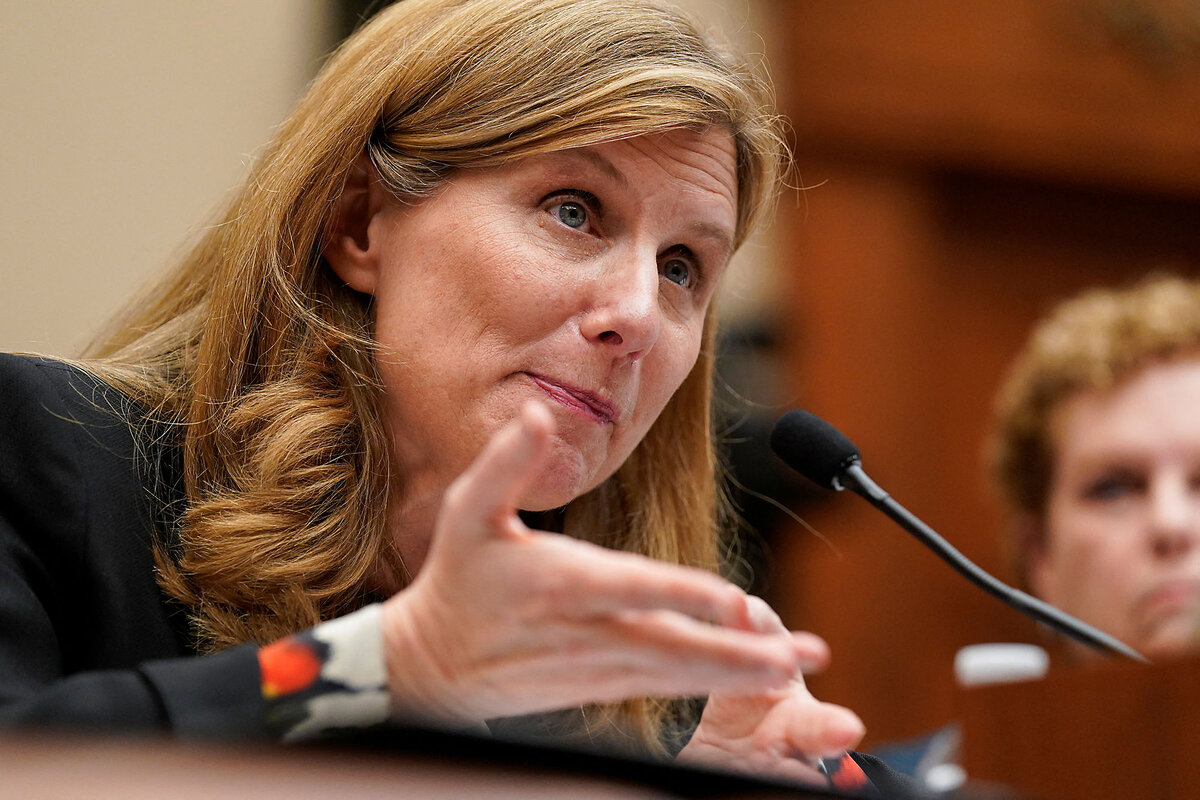So, who wants to be a college president? Anyone?
Loading...
| PHILADELPHIA
From the outside, the job as president of an Ivy League university might not seem so desirable right now. Prestigious? Sure. Lucrative? Certainly. But during the past year, some leaders have had tenures that lasted less time than it takes to make the dean’s list.
Claudine Gay, the first Black woman president at Harvard University, lasted just six months. Minouche Shafik at Columbia University and Liz Magill at the University of Pennsylvania fared slightly better at 13 and 17 months, respectively. But in the end, they all left unceremoniously – along with presidents from other prominent schools – in the wake of mass campus protests against the war in Gaza. So far, none of the universities have named permanent replacements.
That raises the question: Who would want to be a college president right now?
Why We Wrote This
As colleges and universities move toward institutional neutrality policies in the wake of the war in Gaza, a new title is heading many prestigious schools: acting president.
“It’s making the job of a president a really shaky job to take on,” says former college administrator Joe Sallustio, who hosts the “EdUp Experience” podcast.
Dr. Sallustio says that he has spoken to administrators who acknowledge they are wary.
“The pipeline of people that are willing to do that job – I see from those that I talk to – is not drying up, but it is not as juicy of a job as it used to be, because [presidents] are going to have all eyes on [them],” Dr. Sallustio says.
Schools like Columbia faced intense scrutiny after mass protests and encampments turned violent and scores of students were arrested. At the University of Southern California, the spring commencement ceremony was canceled due to arrests and protests on campus. Both former university Presidents Gay and Magill gave what many saw as troublesome testimony in front of Congress last December about their response to antisemitism on campus. At Cornell University, Martha Pollack retired after donors called for her ouster. Dr. Shafik resigned her post at Columbia before this school year started.
Because of the fallout from the protests, colleges have revamped student codes of conduct and increased security measures on campus. And universities are rethinking taking formal stances on divisive topics, something that had become common surrounding issues like climate change and the murder of George Floyd.
Recently, Penn chose to end sociopolitical statements. Its new policy is that the school will not release statements in response to world or local events that don’t have “significant bearing on university functions.” Harvard announced a similar plan in May. Other schools adopting institutional neutrality are Cornell, Johns Hopkins, Stanford University, and the University of Southern California, as well as the University of Texas system.
Why some people no longer want that promotion
It has not been lost on those in academia that many of the presidents losing their jobs have been women and people of color. Stephanie Shonekan is someone who ordinarily might be eyeing a top spot. Two years ago, she was named dean of the University of Maryland’s College of Arts and Humanities. She’s an ethnomusicologist and educator who, as part of her scholarship, has published both a book and research in her field.
“I’m not a president and I don’t plan on being a president,” Dr. Shonekan said at a conference at Penn recently.
“I’ve kind of sat on the sidelines watching what has happened to many women of color the last couple of years,” she said, “and the scrutiny that they got was much more than their peers who are not Black and who are not women. So that gave me pause.”
Dr. Shonekan says she was turned off by how Harvard treated Dr. Gay. Her scholarship was called into question, and Harvard alumnus and billionaire Bill Ackman accused the professor of being merely a “DEI hire.”
“It’s like being the mayor of a small town”
“The best analogy for the college presidency is that it’s like being the mayor of a small town,” says Marjorie Hass, president of the Council of Independent Colleges, an association of 700 independent colleges and universities that supports leadership at those institutions.
Dr. Hass says that Ivy League colleges with ample resources are not a good example of what’s happening in the broader realm of academia, which is facing challenges like declining enrollment and even school closures. Many presidents find themselves in situations without large endowments, or with problems that can’t be solved by wealthy donors.
“You’re constantly in a situation where you can’t solve problems with money; you have to solve them with creativity, with vision, with real leadership skills. You’re moving an institution in a direction, inspiring people to act on behalf of a vision that you have worked with the community to develop,” she adds.
Dr. Hass was president at two schools: Rhodes College in Memphis, Tennessee, and Austin College in Sherman, Texas. She says that people who take on presidencies have to go into them with a firm set of values – and be willing to walk away from the positions if those are threatened. In Texas, she was ready to resign if the state went through with a policy forcing the school to turn over the names of students without legal documentation.
“I had a very come-to-Moses conversation with my board leaders that that was not something that I could personally do,” she remembers. “If that became a legal requirement, either the board would stand by me as I civilly disobeyed the law or I would leave quietly, in a way that didn’t disrupt the institution.”
Texas never made that move mandatory, so she stayed. Dr. Hass concedes that for people of color and women, the additional pressures of being a pioneer are real. For university boards, she urges them to wake up to the fact that colleges are becoming more diverse.
“When boards hire pioneers, they need to be courageous,” Dr. Hass says. “They need to understand that there will be resistance.”
For her part, Dr. Hass says that she has not seen research that would indicate waning interest in the position of president. The job is tough, but fulfilling if you feel called to do the work, she says. Also, people aren’t going to feel sorry for people making the high salaries that presidents can command.
“I felt very badly for her”
Jared Mitovich, a senior, is editor of the daily newspaper at the University of Pennsylvania. He covered the protests on campus last spring. He followed Dr. Magill on Instagram and liked how she would post pictures of her dog and her daily activities. He hopes the next president will be “normal.”
“We heard from one of our board of trustee members who resigned, saying, ‘This presidential search that you’re embarking on is going to be a lot different and might be more challenging because it’s a unique time to be a college president,’” Mr. Mitovich says.
Jonathan Zimmerman is a professor of the history of education at Penn. He describes Dr. Magill as normal and relatable.
“I felt very badly for her,” says Dr. Zimmerman, who says he wasn’t friends with Dr. Magill but had met her a few times. “I do think she could have avoided the land mine.”
Dr. Zimmerman says that during her testimony she could have leaned on the fact that the university had not been consistent with its respect for free speech norms. He also challenges the university moving forward to create environments that are friendlier to free and open expression.
He thinks it is interesting that the four Ivy League schools replaced their presidents with interim leaders from the medical sciences and medical schools. He hypothesizes that this may be in part because they are used to overseeing large budgets and perhaps are less political.
For Dr. Shonekan to change her mind about pursuing a presidency, it would take a board of trustees that lets presidents have more freedom, as well as less input from donors on who should serve. And she would like a job that respects research.
“I want to create a place, a university where scholars can do incredible work that helps us understand the world,” she said. “All of the politicking is taking away from that.”











